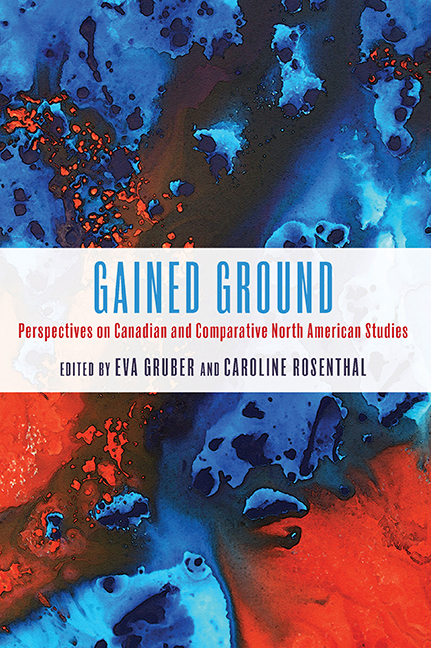Book contents
- Frontmatter
- Contents
- Preface and Acknowledgments
- Introduction
- Part I The Genesis of Canadian and Comparative North American Studies
- Part II Comparative North American Studies: Literary Case Studies
- “Poetics of the Potent”: Yann Martel's Life of Pi, Edgar Allan Poe's The Narrative of Arthur Gordon Pym of Nantucket, and Modes of Transcreation
- “Wanting to Light out for Tender Tenantless Territories”: Reading Landscape in Robert Kroetsch's The Hornbooks of Rita K (2001) and Mark Anthony Jarman's 19 Knives (2000)
- “Landscape–of–the–Heart”: Transgenerational Memory and Relationality in Roy Kiyooka's Mothertalk: Life Stories of Mary Kiyoshi Kiyooka
- Performing Shame: Theatrical Motifs in the Works of Alice Munro and Alison Bechdel
- Timothy Findley's “Stones”: Names, Symbols, and Stories
- Part III Comparative North American Studies beyond Print
- Part IV Coda: Reingard Nischik and Transatlantic Canadian Criticism
- Index
“Landscape–of–the–Heart”: Transgenerational Memory and Relationality in Roy Kiyooka's Mothertalk: Life Stories of Mary Kiyoshi Kiyooka
from Part II - Comparative North American Studies: Literary Case Studies
Published online by Cambridge University Press: 26 October 2019
- Frontmatter
- Contents
- Preface and Acknowledgments
- Introduction
- Part I The Genesis of Canadian and Comparative North American Studies
- Part II Comparative North American Studies: Literary Case Studies
- “Poetics of the Potent”: Yann Martel's Life of Pi, Edgar Allan Poe's The Narrative of Arthur Gordon Pym of Nantucket, and Modes of Transcreation
- “Wanting to Light out for Tender Tenantless Territories”: Reading Landscape in Robert Kroetsch's The Hornbooks of Rita K (2001) and Mark Anthony Jarman's 19 Knives (2000)
- “Landscape–of–the–Heart”: Transgenerational Memory and Relationality in Roy Kiyooka's Mothertalk: Life Stories of Mary Kiyoshi Kiyooka
- Performing Shame: Theatrical Motifs in the Works of Alice Munro and Alison Bechdel
- Timothy Findley's “Stones”: Names, Symbols, and Stories
- Part III Comparative North American Studies beyond Print
- Part IV Coda: Reingard Nischik and Transatlantic Canadian Criticism
- Index
Summary
“HOW ELSE WILL THEY KNOW there is a landscape etched on their hearts which got sown in a bamboo grove?” asks Mary Kiyooka, autobiographical narrator of Nisei artist and poet Roy Kiyooka's auto/biography Mothertalk: Life Stories of Mary Kiyoshi Kiyooka (Kiyooka 1997a, 160). How else but by frequently going “back” to the place of parental origin, that is, to Japan, or, more specifically, to Tosa Province on the island of Shikoku? “Place” is crucial in Kiyooka's narrative, both for the autobiographical narrator and for her descendants; Mothertalk presents an exploration of an individual as well as a family past shaped by an intense awareness of the multilayered—emotional, cultural, historical—inscriptions of both locationality and translocal processes. This exploration, as will be argued below, is auto/biographical rather than autobiographical or biographical. In this exceptional text, to put it with Adriana Cavarero's phrasing in a different context, “autobiographical and biographical genres are superimposed upon one another” (2006, pos. 2910): the story of the mother told as a relational story of her remembrance of her “real home” (Kiyooka 1997a, 29) and her son's exploration of “Japan” as a touchstone for his own subjectivity.
Mothertalk, as the first-person narrative of an immigrant woman, has been mainly read with a focus on its Canadian subject matter, not least because of the significant editorial interventions by her son Roy and by the editor Daphne Marlatt. Marlatt, according to Susanna Egan and Gabriele Helms, “felt strongly that Mary's stories were important for Canadian history…. Ultimately, [Marlatt's] choices have determined that Mary's life stories find their place in the English reader's understanding of the Japanese Canadian experience” (Egan and Helms 1999, 62). Also, the inclusion of two additional essays by Roy Kiyooka in the book, both of which deal with Japanese Canadian history and subject formation, directs the reader's attention to Mothertalk as a narrative centrally embedded in a Canadian context. While the text certainly contributes significantly to an understanding of the complexities of the lives of Japanese immigrant women in Canada, the multilayered structure of the book and its genesis, documented impressively by Susanna Egan and Gabriele Helms as well as by Joanne Saul, also suggest a more strongly pronounced transnational focus.
- Type
- Chapter
- Information
- Gained GroundPerspectives on Canadian and Comparative North American Studies, pp. 93 - 107Publisher: Boydell & BrewerPrint publication year: 2018



